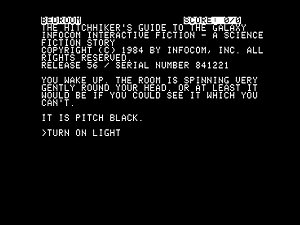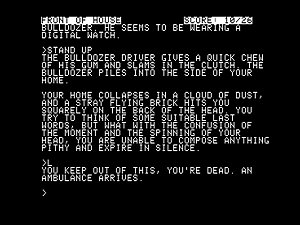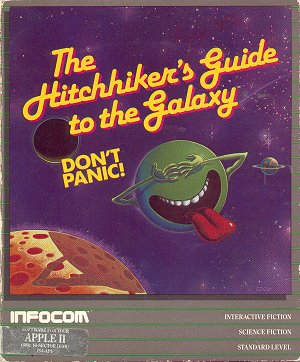 The Game: You’re Arthur Dent, and you’ve woken up with a very bad hangover. Between your state of inebriation and the fact that the Earth will shortly be demolished to make way for a hyperspace bypass, this is an inauspicious start, especially since you must fulfill your destiny as one of the only two human beings left alive in the universe to even begin to get anywhere in this game. (Infocom, 1984)
The Game: You’re Arthur Dent, and you’ve woken up with a very bad hangover. Between your state of inebriation and the fact that the Earth will shortly be demolished to make way for a hyperspace bypass, this is an inauspicious start, especially since you must fulfill your destiny as one of the only two human beings left alive in the universe to even begin to get anywhere in this game. (Infocom, 1984)
Memories: Infocom was the pioneering group of brilliant software designers who took the simple Adventure-style game and elevated it to new heights. By combining an easy-to-use and well-designed interface which understood English, with fascinating worlds created by literate designers and writers, Infocom made some of the most engaging computer games in the history of early silicon.
 “Hitchhiker’s Guide To The Galaxy”, therefore, was a natural, with its hilarious prose, verbal gags which ran the gamut from brilliant to banal, and its outrageous premise and characters. They could have licensed “HHG”, but when original author Douglas Adams was so fascinated with the prospect of interactive fiction, why bother? Adams was in on the game from day one, making it as unique a slice of HHG fiction as the books, the radio serials, the television show, and so on.
“Hitchhiker’s Guide To The Galaxy”, therefore, was a natural, with its hilarious prose, verbal gags which ran the gamut from brilliant to banal, and its outrageous premise and characters. They could have licensed “HHG”, but when original author Douglas Adams was so fascinated with the prospect of interactive fiction, why bother? Adams was in on the game from day one, making it as unique a slice of HHG fiction as the books, the radio serials, the television show, and so on.
In fact, Adams had a lot of fun with the fact that a great many of his players would be very familiar with the universe established in those other media. Things didn’t quite unfold in the same way as in the books or on the radio. Oh hell, who am I kidding? They didn’t even remotely unfold in the same way.
 In some cases, the humorous logic traps of the game were infinitely frustrating, with the necessary actions to solve them and survive so outlandish as to confound even expert players (or, for that matter, well-versed Hitchhiker’s fans).
In some cases, the humorous logic traps of the game were infinitely frustrating, with the necessary actions to solve them and survive so outlandish as to confound even expert players (or, for that matter, well-versed Hitchhiker’s fans).
The packaging, seen in its rare complete form at right, followed closely the design of the books as they were first appearing in the United States, and contained such bonus goodies as peril-sensitive sunglasses (made of solid black cardboard), a “Don’t Panic!” button, and a sealed microscopic space fleet (basically, an empty plastic bag). Within the box was a booklet on “How To See The Universe For Less Than Twenty Altairian Dollars A Day”, though many have observed – and Adams himself has later confirmed – that the author had nothing to do with this booklet, which was actually an Infocom concoction.